Concrete Perspectives May 2017
Internal News
The 22nd BIBM Congress 2017 took place on 17-19 May 2017 in Madrid, Spain with more than 650 registered participants, including exhibitors.
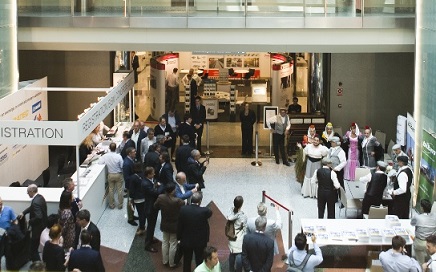
The Congress offered more than 30 presentations with three plenary and three parallel sessions showing interesting best examples in sustainable production and promoting sustainable markets.
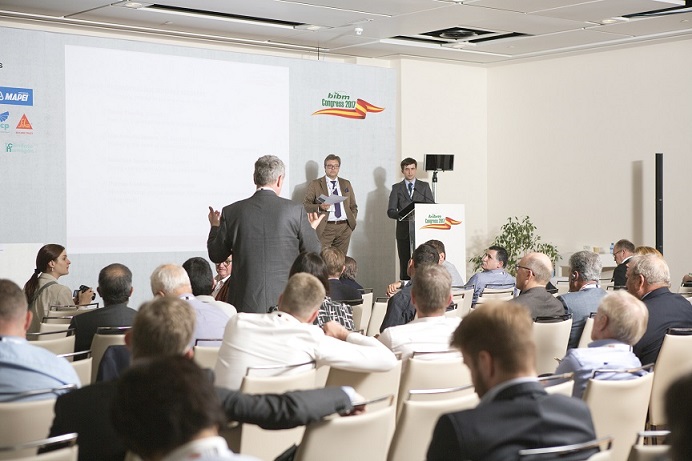
After the welcome of BIBM President, ANDECE President and the BIBM Secretariat, the Congress offered a setting the scene session with presentations about the construction sector market conditions and policy developments, the impact of COP 21 on the sector and the impact of European policies on the daily business of concrete producers.
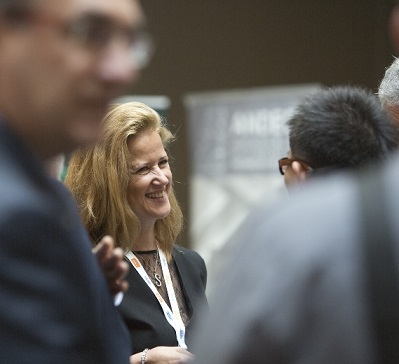
Throughout the Congress, examples from Latin-America varied the EU focus of the lectures and brought a new different insight into the European scene.
Parallel sessions were organised to offer exciting lectures for audience with both technical and marketing background. Its carefully organised schedule enabled participants to switch sessions to listen to a presentation. Networking coffee breaks and lunch breaks took place in the exhibition area where more than 60 exhibitors presented their solutions.
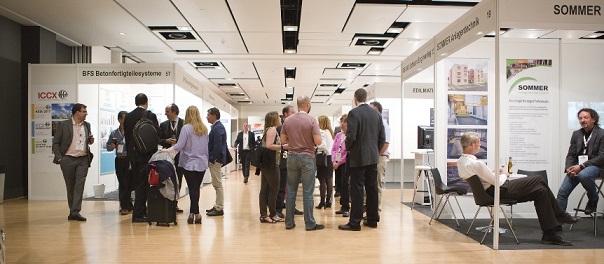
The sustainable production sessions were moderated by Alessio Rimoldi, Secretary General of BIBM and the lectures varied from issues such as circular economy, innovation, Environment Product Declarations (EPDs), health and safety of workers.
Promoting sustainable markets sessions were moderated by Dr. Ulrich Lotz Chairman of BIBM Communication Commission, Gernot Brandweiner Chairman of BIBM Technical Commission and Zsuzsa Amina Koubaa, European Public Affairs Manager of BIBM. Interesting market solutions and new market opportunities were presented.
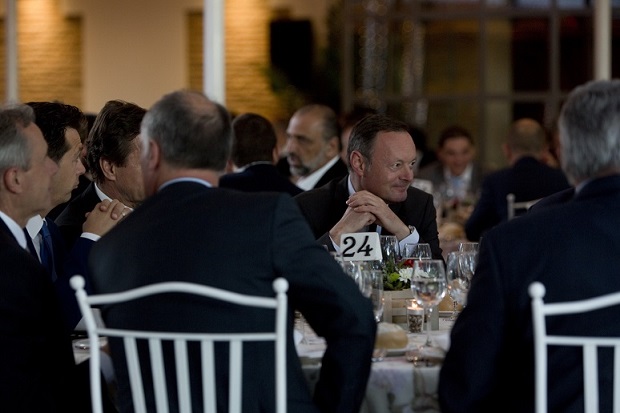
The last plenary session presented market developments for concrete such as Rebuilding vs. Renovation, urbanisation and energy saving innovations.
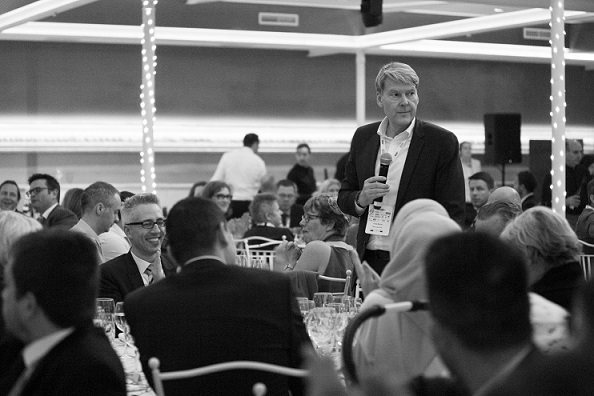
The BIBM General Assembly -held 18 May- elected the new President, Claus Bering from CRH Concrete, who gave his first speech at the Gala Dinner on Thursday evening.
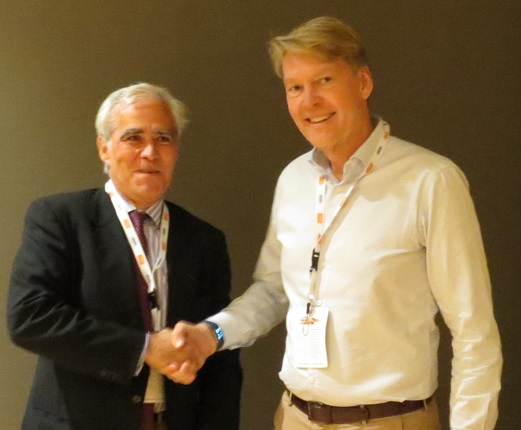
Jaime Delclaux and Claus Bering (then and current President)
You can read more about the election of the new President here.
Construction Sector
VEEP International Worksop
The first international workshop of the VEEP Project took place in the framework of the BIBM Congress in Madrid on 17 May. There were approximately 70 participants from 20 different countries, and it was strategically held at the beginning of the project (7th month). The aim of the Workshop was to engage with stakeholders, communicate openly about the project to avoid any mistakes in the future and ensure that the project has started with the right assumptions.
The Workshop programme was pretty dense for the day with several presentations from the project partners, a networking lunch and a roundtable discussion.
Marketing and Promotion of Concrete workshop – The Concrete Initiative
The Concrete Initiative organised an international Marketing and Promotion of Concrete workshop on 17th May in Madrid, ahead of the BIBM Congress 2017. The Workshop had a great interest with international participants from Latin America and Australia.
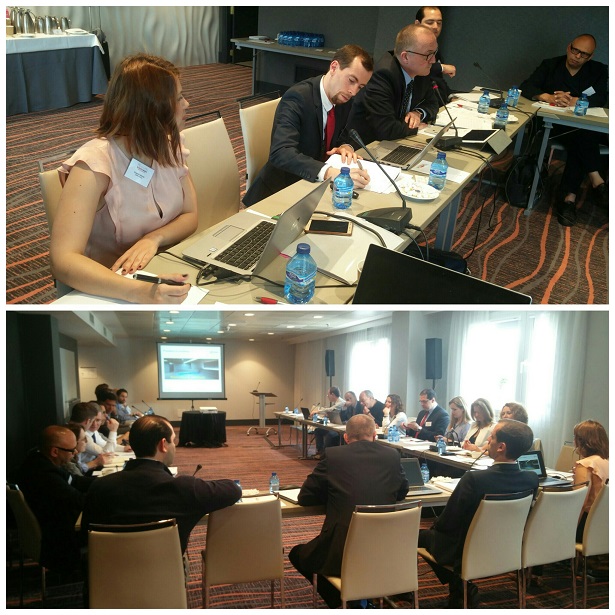
The programme included promotion to architects and students, and different national platforms, visiting tours and awards were presented to attract and educate architects and students about concrete.
Furthermore, best examples from Greece, Spain (port construction) and Latin America were presented.
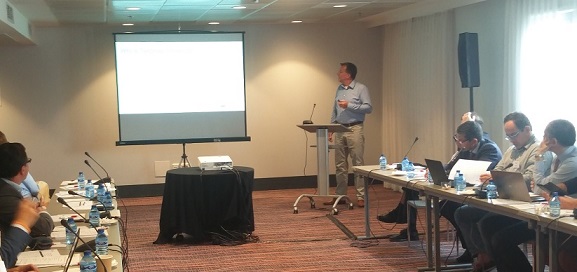
Live from the European Union
Council Conclusions on a future EU industrial policy strategy
On 30 May, Industry Commissioner Elżbieta Bieńkowska announced at a press conference that Member States are very supportive regarding the EU’s industrial strategy and that the conclusions of the Maltese Presidency were unanimously adopted.
She also announced that the Commission will prepare a horizontal legislative document with sectoral approaches which will be “coherent” and “unified”. It comes as a relief for Member States that the Commission finally admits that there is a need for a coherent, harmonised strong industrial policy.
The Commissioner didn’t give more details about the form and the content of the future “industrial policy document” and she didn’t comment on the timeline requested by the Council (i.e. March 2018 for a presentation of the industrial strategy to the Heads of States and Governments).
Therefore, it is necessary to continue the advocacy of the Joint Declaration -what BIBM co-signed- and to actively contribute for the preparation of this industrial policy document.
Energy Ministers can’t agree on new energy targets
On 18 May, EU Energy Ministers had an informal meeting in Malta where they discussed the revision of the Energy Efficiency Directive (EED) and the Energy Performance of Buildings Directive (EPBD).
During the meeting it became clear that the Council is not unanimous, and even though the European Commission set a legally-binding objective for EU countries to cut energy consumption by 30% come 2030 (in November), some ministers are against the binding target or want to lower it.
“On Article 7, several member states pushed for flexibilities,” said the spokesperson of the Maltese Presidency.
While the agreement of the Council is still under discussion, the Estonian Presidency (who will take over from Malta the Presidency of the Council of the EU on 1 July) and the European Commission put pressure on the Maltese Presidency to finalise the package in June.
More information – Council of EU
National Award Winner Projects
Austria: Concrete Student Trophy 2016- A pendulum cableway in the cultural landscape of the Wachau
Project definition: Preliminary design of a barrier-free pendulum cableway for pedestrians and cyclists to connect Aggsbach-Dorf with Aggsbach-Markt, two villages which are separated by the Danube river. To ensure the profitability the cableway had to run fully automatically without any operator assistance. As the Wachau was inscribed as “Wachau Cultural Landscape” in the UNESCO List of World Heritage Sites in recognition of its architectural and agricultural history the student’s designs should be environmentally friendly, landscape gently, energy saving and of course within the framework of the proposed urban-planning development. The solutions also had to include the surrounding areas: a multiple use for recreational activities (e.g. sports, cultural events) as well as parking lots and traffic zones need to be developed.
Furthermore, not only a clever idea with respect to architecture had to be found, but it is also necessary to make calculations and develop building procedures, due to the main goal of the CST: architects and civil engineers must learn to work hand in hand. The students furthermore should present detailed descriptions and models for visualisation. The sophisticated solutions presented by the students were highly appreciated by the members of the jury, consisting of architects, civil engineers, representatives of the building and cement industries as well as the mayors of Aggsbach-Dorf and Aggsbach-Markt.
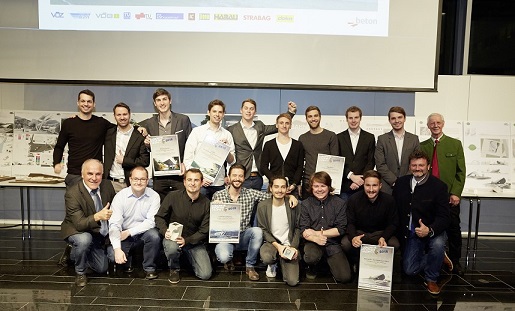
The first price (€ 4000.-) was awarded to students of two different universities: the University of Applied Arts Vienna and the Vienna University of Technology. The second price (€ 3000.-) went to a team of the Vienna University of Technology, the third price to the Technical University in Graz. In addition two teams won appreciation awards of € 1000.- each. The jury decided to split the remaining € 1000.- between the excreted submissions.
Winning project: „Lufthafen Wachau” (Felix Stadler, Jan Niklas Schöpf, Michael Knoll)
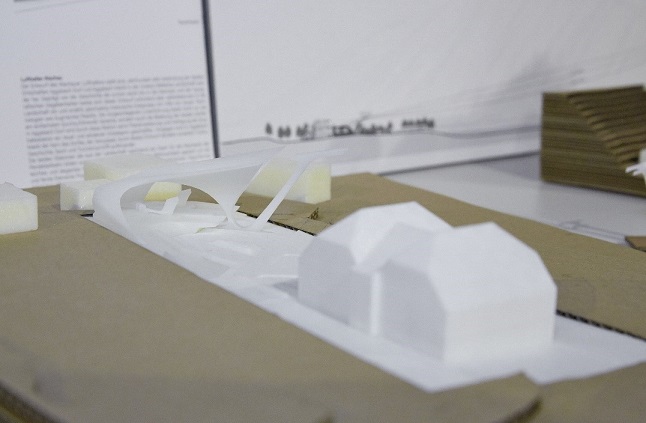
The winning team was able to convince the jury with a visually appealing, aesthetic concept. Their idea of an „Augmented-Reality-App“ complies with the latest developments and attracts young people.
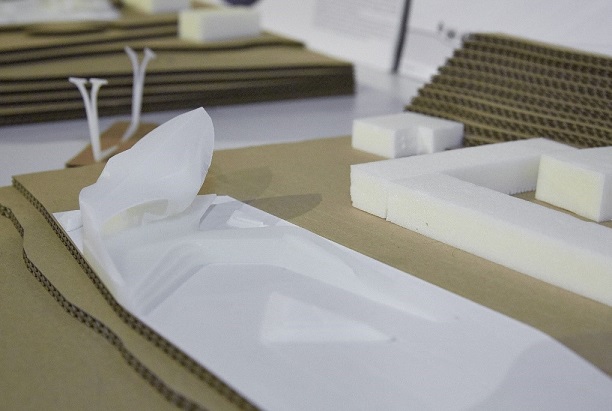
The cableway’s shaping looks like an opening shell, the pillars are constructed at a high level. The project grows out of this unique landscape, the whole design is an incomparable eyecatcher.
Second price project: „LUPE” (Christopher Emil Kreminger, Dominic Mimlich, Guido Bauer)
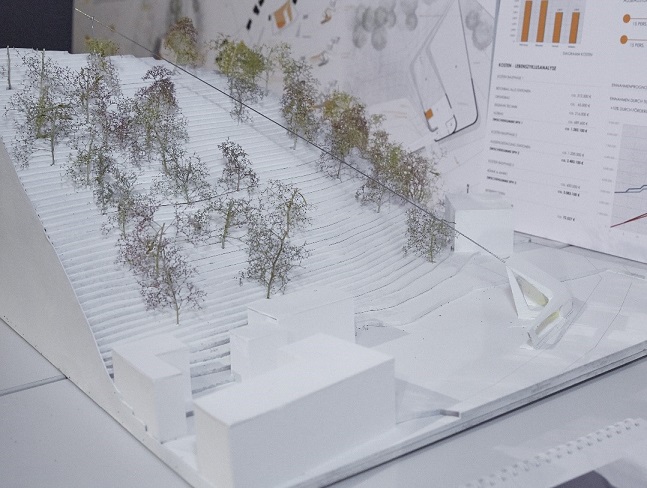
„LUPE” stands out with an excellent architectural concept. The valley stations comply easily with the landscape. It’s the only project with a third station on top of the mountain. With this idea the team shows it’s independence and ability to create more than just a connection between the two villages.
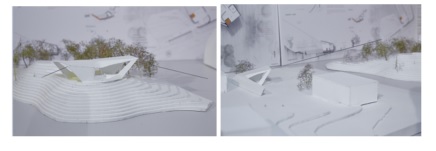
The third price project: „AggsBahn“ (Gernot Kraut, Nico Rauchenwald, Maximilian Fiebich)
„AggsBahn“ is a project that at first sight appears simple and pragmatic, but then turns out to be very charming. The cableway stations look very similar to the familyhouses in this area, their discreet appearance fits perfectly with the contemporary architecture on site. The design of the square unfolds in a natural way. The full potentialities of concrete were barely exploited. The jury also misses a design in greater detail.
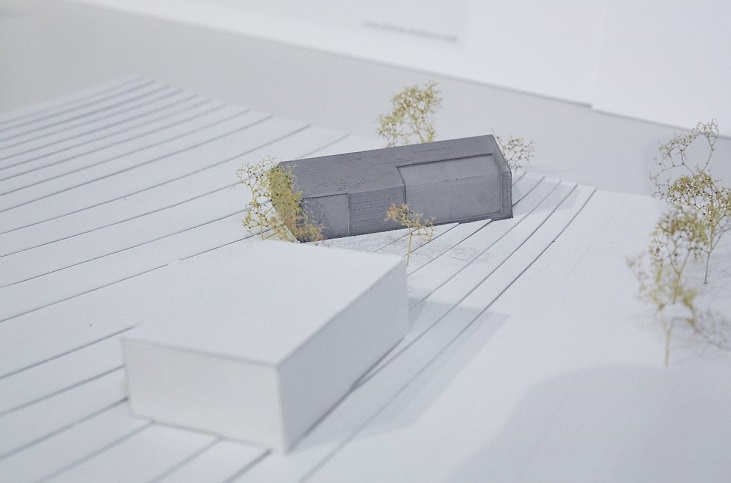
News in brief
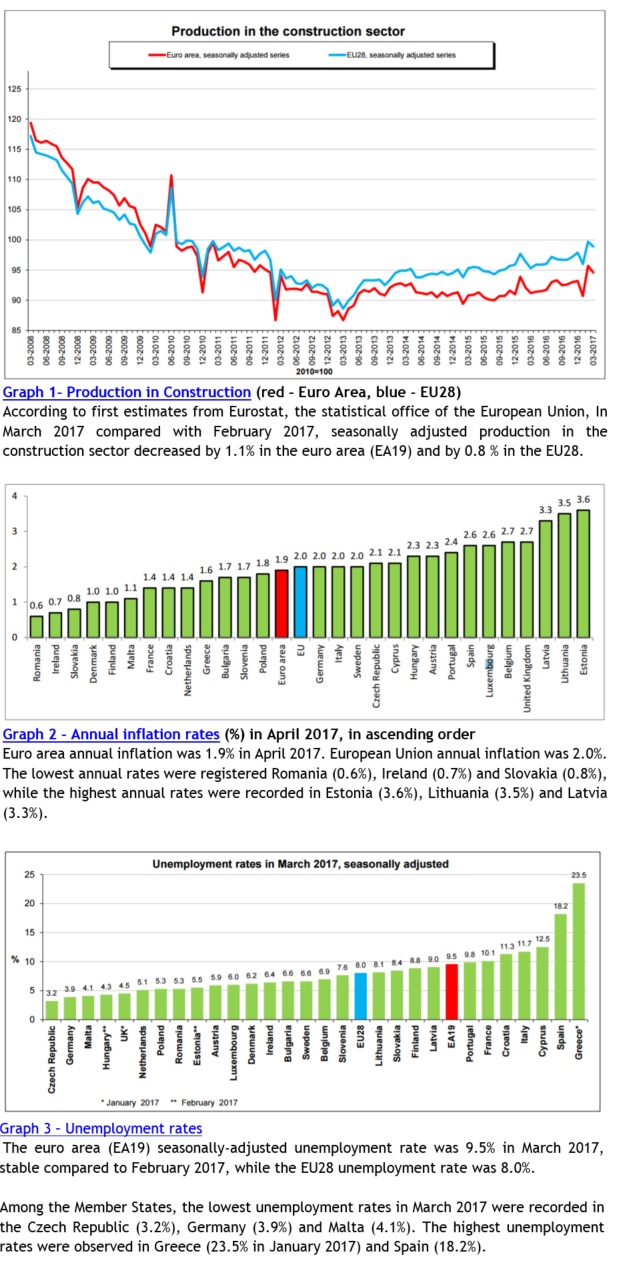
Agenda
JUNE 2017
7 June
CPE General Assembly
Brussels, Belgium
7 June
Smart readiness indicator workshop
Brussels, Belgium
13 June
BIBM TF Eurocode 2 revision
Brussels, Belgium
13 June
SMAART meeting
Brussels, Belgium
14-16 June
Brussels, Belgium
19 June
ECP TF Sustainable Concrete
Confcall
21-23 June
Delft, The Netherlands
27 June
CPE CPR Implementation TG
Brussels, Belgium
JULY 2017
04 July
CEN/TC 104/TG 20 Carbonation
Brussels, Belgium
05 July
CPE Sustainability WG
Brussels, Belgium
07 July
Concrete Initiative AhG
Brussels, Belgium
11 July
CEN/TC 229/WG 4
Brussels, Belgium
The 6th edition of the IPHA Newsletter is available here.
To the Newsletter of Construction Products Europe (former CEPMC), please follow this link.
To read the Newsletter of CEMBUREAU, please follow this link. You can also subscribe directly following this link http://www.cembureau.eu/newsletter/subscriptions.
To read the Quarterly Newsletter of The Concrete Initiative, please follow this link.
List of Acronyms:
CPE – Construction Product Europe
DG GROW – Directorate-General for Internal Market, Industry, Entrepreneurship and SMEs
ECP – European Concrete Platform
EMA – European Masonry Alliance
IPHA – International Pre-stressed Hollowcore Association
TF – Task Force
VEEP Project- Cost-Effective Recycling of CDW in High Added Value Energy Efficient Prefabricated Concrete Components for Massive Retrofitting of our Built Environment
